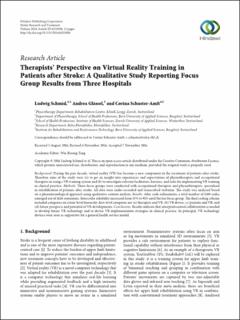Bitte benutzen Sie diese Kennung, um auf die Ressource zu verweisen:
https://doi.org/10.21256/zhaw-4936| Publikationstyp: | Beitrag in wissenschaftlicher Zeitschrift |
| Art der Begutachtung: | Peer review (Publikation) |
| Titel: | Therapists’ perspective on virtual reality based treatments in patients after stroke : a qualitative study reporting focus group results from three hospitals |
| Autor/-in: | Schmid, Ludwig Glässel, Andrea Schuster-Amft, Corina |
| DOI: | 10.21256/zhaw-4936 10.1155/2016/6210508 |
| Erschienen in: | Stroke Research and Treatment |
| Band(Heft): | 2016 |
| Erscheinungsdatum: | 2016 |
| Verlag / Hrsg. Institution: | Sage-Hindawi |
| ISSN: | 2042-0056 2090-8105 |
| Sprache: | Englisch |
| Schlagwörter: | Focus groups; Virtual Reality; Qualitative Methods; Interprofessional collaboration |
| Fachgebiet (DDC): | 615: Pharmakologie und Therapeutik 616.8: Neurologie und Krankheiten des Nervensystems |
| Zusammenfassung: | Background. During the past decade, virtual reality (VR) has become a new component in the treatment of patients after stroke. Therefore aims of the study were (a) to get an insight into experiences and expectations of physiotherapists and occupational therapists in using a VR training system and (b) to investigate relevant facilitators, barriers, and risks for implementing VR training in clinical practice. Methods. Three focus groups were conducted with occupational therapists and physiotherapists, specialised in rehabilitation of patients after stroke. All data were audio-recorded and transcribed verbatim. The study was analysed based on a phenomenological approach using qualitative content analysis. Results. After code refinements, a total number of 1289 codes emerged out of 1626 statements. Intercoder reliability increased from 53% to 91% until the last focus group. The final coding scheme included categories on a four-level hierarchy: first-level categories are (a) therapists and VR, (b) VR device, (c) patients and VR, and (d) future prospects and potential of VR developments. Conclusions. Results indicate that interprofessional collaboration is needed to develop future VR technology and to devise VR implementation strategies in clinical practice. In principal, VR technology devices were seen as supportive for a general health service model. |
| URI: | https://digitalcollection.zhaw.ch/handle/11475/13850 |
| Volltext Version: | Publizierte Version |
| Lizenz (gemäss Verlagsvertrag): | CC BY 4.0: Namensnennung 4.0 International |
| Departement: | Gesundheit |
| Organisationseinheit: | Institut für Public Health (IPH) |
| Enthalten in den Sammlungen: | Publikationen Gesundheit |
Dateien zu dieser Ressource:
| Datei | Beschreibung | Größe | Format | |
|---|---|---|---|---|
| 2016_Glaessel_Therapists_perspective_on_virtual_reality_bosed_treatments.pdf | 1.43 MB | Adobe PDF |  Öffnen/Anzeigen |
Zur Langanzeige
Schmid, L., Glässel, A., & Schuster-Amft, C. (2016). Therapists’ perspective on virtual reality based treatments in patients after stroke : a qualitative study reporting focus group results from three hospitals. Stroke Research and Treatment, 2016. https://doi.org/10.21256/zhaw-4936
Schmid, L., Glässel, A. and Schuster-Amft, C. (2016) ‘Therapists’ perspective on virtual reality based treatments in patients after stroke : a qualitative study reporting focus group results from three hospitals’, Stroke Research and Treatment, 2016. Available at: https://doi.org/10.21256/zhaw-4936.
L. Schmid, A. Glässel, and C. Schuster-Amft, “Therapists’ perspective on virtual reality based treatments in patients after stroke : a qualitative study reporting focus group results from three hospitals,” Stroke Research and Treatment, vol. 2016, 2016, doi: 10.21256/zhaw-4936.
SCHMID, Ludwig, Andrea GLÄSSEL und Corina SCHUSTER-AMFT, 2016. Therapists’ perspective on virtual reality based treatments in patients after stroke : a qualitative study reporting focus group results from three hospitals. Stroke Research and Treatment. 2016. Bd. 2016. DOI 10.21256/zhaw-4936
Schmid, Ludwig, Andrea Glässel, and Corina Schuster-Amft. 2016. “Therapists’ Perspective on Virtual Reality Based Treatments in Patients after Stroke : A Qualitative Study Reporting Focus Group Results from Three Hospitals.” Stroke Research and Treatment 2016. https://doi.org/10.21256/zhaw-4936.
Schmid, Ludwig, et al. “Therapists’ Perspective on Virtual Reality Based Treatments in Patients after Stroke : A Qualitative Study Reporting Focus Group Results from Three Hospitals.” Stroke Research and Treatment, vol. 2016, 2016, https://doi.org/10.21256/zhaw-4936.
Alle Ressourcen in diesem Repository sind urheberrechtlich geschützt, soweit nicht anderweitig angezeigt.